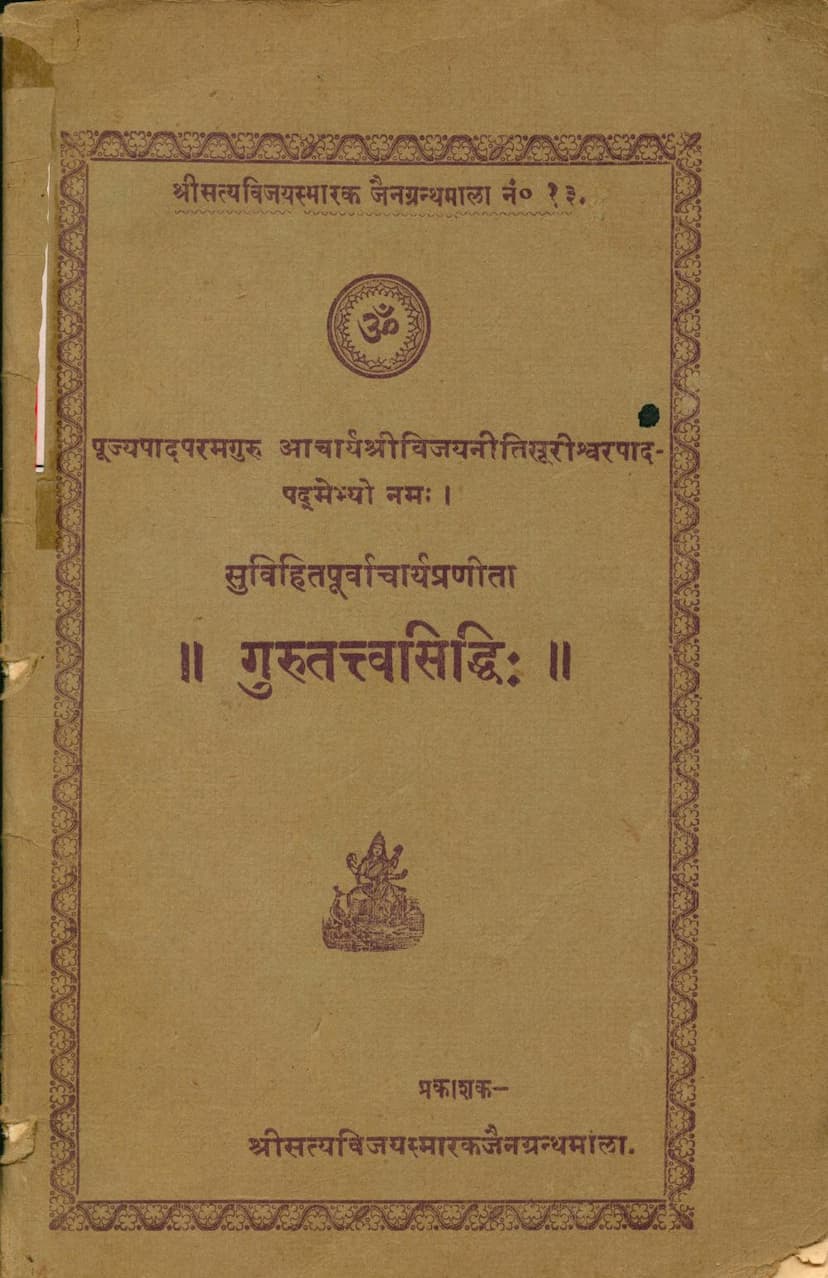Gurutattva Siddhi
Added to library: September 1, 2025

Summary
This Jain text, "Gurutattva Siddhi" (गुरुतत्त्वसिद्धिः), authored by Suvihit Purvacharya and published by Satyavijay Smarak Jain Granthmala, is a profound exploration of the significance of the Guru (spiritual preceptor) within Jainism. The text, meticulously compiled and edited by Muni Shri Manvijay, aims to establish the paramount importance of the Guru, particularly in the context of understanding and practicing Jain principles.
The core argument of "Gurutattva Siddhi" is that the Guru is the linchpin for attaining true knowledge and realization of the other two fundamental Jain tenets: Dev (God/Tirthankaras) and Dharma (Righteousness/the teachings). Without the guidance of a qualified Guru, the true essence of Dev and Dharma remains inaccessible, even with knowledge and ethical conduct.
Key themes and arguments presented in the text include:
- The Guru as the Cause for Understanding Dev and Dharma: The text emphasizes that Gurus are the ones who illuminate the nature of the Divine and the path of Dharma. Their teachings are essential for a correct understanding, as stated in the quoted verse: "The good Guru is the cause for [understanding] Dev and Dharma. He who disrespects the Guru has insulted all three."
- The Primacy of the Guru Tattva: Citing the words of Munisundarsurishwarji Maharaj, the book argues that among all the tattvas (principles), the Guru tattva is the most significant because the practice of various dharmic duties and observances is made possible through their guidance.
- Addressing Criticisms and Misinterpretations: A significant portion of the text, particularly the introductory "Prastavana" (Preface) and the commentary by Muni Shri Manvijay, addresses contemporary criticisms and misinterpretations of Jain principles. It defends the practices of contemporary sadhus (monks) who, due to the limitations of the Avsarpini Kaal (descending era), might not possess the same physical strength or perform all actions with the same rigor as in previous times. The author argues that minor lapses (Apavada) or deviations do not negate the overall essence of their character or practice.
- Defense of Contemporary Sadhus: The text tackles the argument that some sadhus are not worthy of reverence (Avandaniya) based on scriptural verses that describe various types of flawed monks (like Pakshya, Avsanna, Kushil, Samsakta, Yathachhanda). The author meticulously explains these categories, drawing heavily from scriptures like the Avashyak Niryukti and Bhagavati Sutra, to demonstrate that:
- Not all contemporary sadhus fit these negative descriptions.
- Even those who exhibit minor deviations (Apavada) do not entirely abandon their vows (Mulguna and Uttaraguna).
- The text provides detailed classifications of types of monks like Pulaka, Vakusha, and Kushila, differentiating between those who violate basic vows (Mulguna) and those who violate secondary vows (Uttaraguna).
- It argues that sadhus who uphold the principles to the best of their ability according to the time, place, and circumstances are still worthy of respect and reverence.
- Historical Context and the Life of Shri Satya Vijayji: The book includes biographical details of Shri Satya Vijayji, a significant figure associated with the Tapa Gachha. His life story highlights his commitment to upholding strict practices (Kriyoddhar) and his deep spiritual understanding, which led him to advocate for adherence to the true spirit of Jain conduct, even when it meant challenging established norms. The preface also discusses the "Satyavijay Jain Granthmala" and its mission.
- The Importance of Correct Understanding of Scriptures: The text stresses the need for a profound and nuanced understanding of Jain scriptures, warning against misinterpretations that lead to the denigration of worthy spiritual practitioners. It emphasizes that the scriptures are vast and require careful study and interpretation, especially concerning the behavior of monks in different eras.
- The "Gurutattva Siddhi" Title: The title itself signifies the "Establishment of the Truth of the Guru," underscoring the book's purpose to firmly establish and validate the Guru's essential role.
- Inclusion of Related Texts: The book also includes "Pratimagundosh Vichar" (Discourse on the Merits and Demerits of Images) as a supplementary text, further enhancing its scope by discussing the proper examination of Jina images and their worship, which is also often guided by Gurus.
In essence, "Gurutattva Siddhi" is a powerful defense of the Guru's indispensable role in the Jain tradition. It serves as a corrective to potentially misguided interpretations of scriptures and contemporary practices, urging readers to seek genuine spiritual guidance and uphold the revered status of the Guru for true spiritual progress.